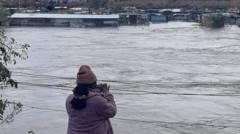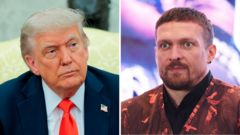While facing intense scrutiny and accusations from Donald Trump during a high-stakes meeting, South African President Cyril Ramaphosa may paradoxically reinforce his domestic standing by showcasing his diplomatic acumen, as pressures mount from various fronts at home.
Ramaphosa's Diplomatic Dance with Trump: Strengthening Home Support Amid Controversy

Ramaphosa's Diplomatic Dance with Trump: Strengthening Home Support Amid Controversy
President Cyril Ramaphosa's tense meeting with Donald Trump may bolster his position domestically despite international rebuke.
This week, South African President Cyril Ramaphosa found himself in a precarious situation during a highly publicized meeting with former U.S. President Donald Trump. Ramaphosa's delegation arrived in Washington with hopes of reviving relations and securing trade deals, but instead faced a barrage of insults and unfounded claims from Trump. The encounter resembled a challenging performance review, played out to a global audience.
Despite the tense atmosphere, Ramaphosa received praise for maintaining his composure in the face of Trump's provocations, even as critics argued that he should have mounted a stronger defense against the unfounded allegations of a "white genocide" in South Africa. Returning home, Ramaphosa is likely to confront a different landscape, as he navigates the complexities of a coalition government stretched thin by internal strife following disappointing election results.
Since the ANC, South Africa's ruling party, formed a coalition government nearly a year ago with 10 other parties—a move made necessary by a decline in electoral support—it has faced significant challenges. Disputes over land and healthcare reforms, along with contentious budget proposals impacting the most vulnerable, have heightened tensions among coalition members. South Africa’s economy is teetering on the brink of stagnation, with escalating crime and corruption rates further eroding public trust in the government.
Domestically, Ramaphosa's critics are gaining traction, with figures such as Julius Malema of the Economic Freedom Fighters using the meeting's fallout to amplify their voice. However, many South Africans view the meeting as a reaffirmation of Ramaphosa's diplomatic capabilities and a reminder of his historic role in stabilizing the nation.
Despite the challenges that await him at home, including ongoing political pressure and the need to uphold coalition unity, the positive optics of the meeting in Washington may serve to bolster his standing among South Africans. Observers suggest that leaks of Trump's derogatory comments might resonate with many citizens weary of the extremes in their politics, thereby reinforcing support for Ramaphosa’s steadier approach amidst crisis.
Moreover, as the country navigates a volatile political landscape, breaking applause from allies suggests that South Africa's coalition government may appear more unified and robust in the light of international scrutiny. Supporters of Ramaphosa laud his ability to maintain a calm demeanor in high-pressure scenarios, enhancing his image as a reliable leader.
While the meeting with Trump did not yield the promise of renewed trade relations that Ramaphosa sought, its implications for domestic politics could ultimately work in his favor, as observers continue to reflect on the significance of stability and unity in leadership during tumultuous times.
As political dynamics continue to evolve, and with the 2027 elective conference approaching, the South African president must remain adept at navigating his country's multifaceted challenges—all while reflecting on the lessons from his recent encounter with Trump and positioning himself as a pivotal figure in South Africa's future.





















